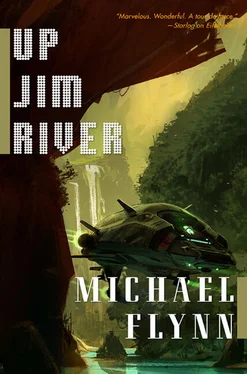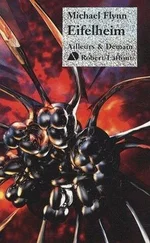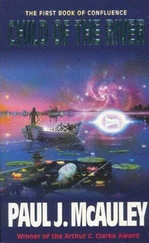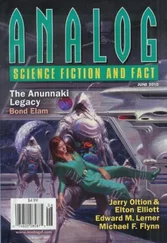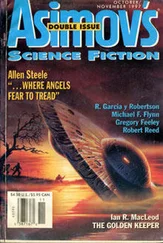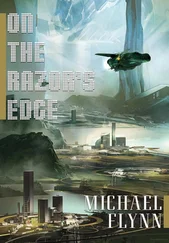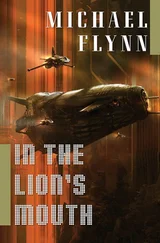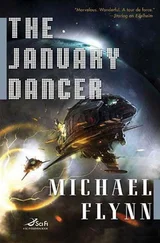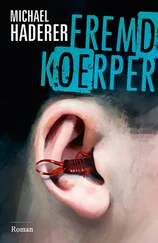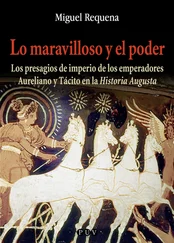“We don’t think. We take votes.”
Méarana leapt to her feet and clapped her hands. “But it’s something new, at least. It’s something none of the others have looked into! Oh, F—Fudir! I knew it was the right thing to bring you along!” She threw her arms around the scarred man’s neck, and he could not back off in time to evade them. “We’ll find her. I know we will.”
Donovan carefully disengaged from her embrace and stepped back. “No, we won’t. If we’re lucky, we’ll find out what sent her off on her last quest. If we are luckier still, we’ll find the thing she was hunting for. If we are luckiest of all, we won’t.”
“You’re a horrible man.”
“Whatever killed your mother would make short work of us. It’s one thing to learn what it was; another to get anywhere near it.”
“If we find it,” she said confidently, “we’ll find Mother.”
The scarred man looked at her bleakly, but he said nothing and after a moment he turned away. “I want you to place an Ourobouros call to your home on Dangchao. Is there someone there you can trust? Do you have a secure code?”
“It was Mother’s code. And yes, Hang Tenbottles has been with the family for ages, and his father practically raised me. He’s segundo on the ranch—runs it, really—and he’s been like an older brother to me.”
“All right, all right. You can trust this Tenbottles. Can he access the household gods?”
“The lares or the penates?”
“The penates. I don’t think the home security system would tell us anything useful. Unless someone’s been nosing around your place…?”
“Only Gwillgi, and he came openly.”
“You wouldn’t have known it if he hadn’t. Gwillgi doesn’t show up on ordinary home security systems.”
“Mother is a Hound. There is nothing ordinary about our security system.”
Donovan grunted. “Fine. What I want you to do is encrypt a message to this Tenbottles; have him check the household database and find out what your mother was reading during her home leave.”
“But Gwillgi already—”
“Something may seem more significant after we’ve nosed around on Thistlewaite. Go to the ship’s Passenger Comm Center tomorrow and give them the message so they can put it in the squirt queue for the next system we pass through with an Ourobouros station. Khlaphalon, I think. Tell Tenbottles to send the reply in care of the Plough and Stars on Harpaloon. We’ll catch up with it there.”
“Why not send it to us on Thistlewaite?”
“Because I don’t want anything on record that puts us on Thistlewaite. The Kennel may be monitoring transmissions in and out of Dangchao.”
The harper frowned and bit her lip. “You want to keep the Kennel in the dark? But aren’t we working with the Kennel? They gave us a chit, and letters of transit…”
The scarred man crossed his arms. “Let’s find out what Bridget ban thought she had before we lead the Hounds—or anyone else—to it.”
IV. ON RICKETY THISTLEWAITE
There is an ancient Terran word: rickety. It is not clear to scholars what this word meant exactly, but that it applied to Thistlewaite was undoubted. “Rickety Thistlewaite” had been its appellation from the beginning, from the days before even the First Ships set down. At least, if you can depend on their legends, which like everything else there, are shaky. The planet’s nature can be seen in its propensity to earthquakes. Somebody had forgotten to caulk the seams of her plates and they slip and slide with greasier abandon than they do on more gritty worlds. “As sturdy as a Thistlewaite skyscraper” is a proverb on half the planets of the South Central Periphery. The Thistles are not so mad as to build skyscrapers—and so the proverb does double-duty. What can be more sturdy than something left unbuilt, runs a Thistlean joke. A building never erected can never fall down. Ha, ha. But the Thistles have developed a keen sense of balance along with their mordant wit, and a fatalistic conviction that nothing can ever be done that will not eventually fail .
They have contrived no fewer than fourteen states in the tropic belt between the Mountains Acreeping and the River Everwinding, for their political structures are no more permanent than their architectural ones. There had once upon a time been a single state—an Empire, in a modest Thistlean fashion—but it, too, had collapsed .
“In the days of the gods, the seedships came,” begins an ancient story of theirs, the first of the Cautionary Books. Most of the Periphery takes the gods only half seriously, but on Thistlewaite they are taken wholly so . Of course, the gods are real—and they are absentminded and fumble-thumbed. How else to account for matters? Only the great sky gods—Einstein, Planck, Alfven—are steady and reliable. And who can blame them? The starry heavens above have alone not come crashing down upon them .
The harper and the scarred man disembarked the throughliner without exciting interest, and here the money that the Fudir had cast upon the steward—as well as a certain grip exchanged in the hand clasp—returned value a hundredfold. The steward had agreed to slip them into the exit queue as smoothly as the Fudir had slipped the buckshish into his palm; maintain otherwise the fiction that they were still aboard ship; and on arrival off Harpaloon see that their trunks were delivered to the Phundaugh Plough and Stars. Terrans would do anything for buck’ and sometimes even for Brotherhood.
It was three days down from Curling Dawn to Floating Hyacinth Platform in stationary station above Hifocal Big Town, the once-upon-a-time imperial capital. The bumboats and platform were operated by House of Chan, which contracted for port operations on any number of worlds. From Floating Hyacinth, ferries rose and fell to each of the Fourteen States.
Bridget ban had supervised the relief work from Jenlùshy, in Morning Dew sheen, where most of the devastation had occurred. “Sheens” were what the Thistles called their states, and Morning Dew was the literal translation of Jenlùshy. “Everything means something,” Méarana said, “if you dig deeply enough.”
Donovan believed that if you dug even more deeply, all meaning would vanish; but he did not share this thought with his companion, nor was he single-minded about it. The scarred man was said to be most disagreeable; but most of his disagreements were with himself.
They took the “high speed line” from the shuttle port into Jenlùshy. The train was slow when judged against those of less rickety worlds. There is a limit to the velocities one gambles when the land may ripple the monorail in surprising and undesired ways. On the other hand, there was a sense that the faster the trip, the less likely that a quake would catch the train along the way. Hence the motto of the Thistlewaite Bullet: “Hasten slowly.”
Jenlùshy had sat on the epicenter of the great thistlequake and two-thirds of the sheen had been knocked about like jackstraws and flinders. This in itself was no great thing. Many of the poorer buildings were routinely constructed of little more than paper reinforced by’ boo-poles. But the Palace had been made of sterner stuff, and the One Man, the Grand Secretary, and five of the Six Ministers had perished in its collapse. Across the countryside collapsing province-towns, mountain landslides, floods, and fires had swallowed two-thirds of the District Commissioners, along with half the dough-riders. In a state as highly centralized as the Jenlùshy sheen, that was the equivalent of a frontal lobotomy.
Some Administrative Commissions kicked like pithed frogs, but every decision a Jenlùshy official made required ratification by an official higher up—and most of the high-ups had been laid low. The praefect of the Eastern Marshes, on her own initiative, traveled to Hifocal Big Town in the next sheen over to ask for League help over the Ourobouros Circuit. She was publicly caned by the Eastern Marshes Surveillance Commission for this breach of filial subservience—it didn’t matter that there had been no superiors to be subservient to—but Bridget ban had arrived shortly after, took matters well in hand, and for nearly two years was, for all practical purposes, Empress of the Morning Dew.
Читать дальше
